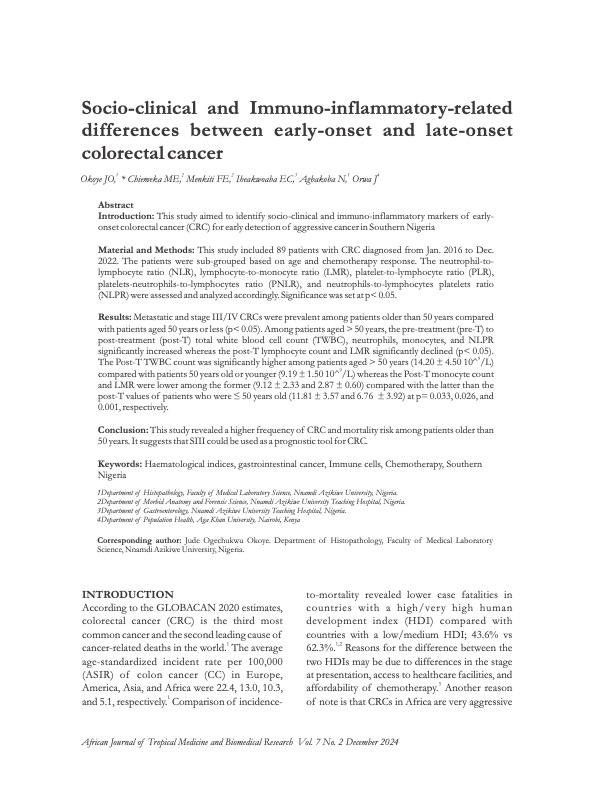Socio-Clinical and Immuno-Inflammatory-Related Differences Between Early-Onset and Late onset Colorectal Cancer
DOI:
https://doi.org/10.4314/ajtmbr.v7i2.5Keywords:
Haematological indices, Gastrointestinal cancer, Immune cells, chemotherapy, Southern NigeriaAbstract
Introduction: This study aimed to identify socio-clinical and immuno-inflammatory markers of earlyonset colorectal cancer (CRC) for early detection of aggressive cancer in Southern Nigeria.
Material and Methods: This study included 89 patients with CRC diagnosed from Jan. 2016 to Dec. 2022. The patients were sub-grouped based on age and chemotherapy response. The neutrophil-tolymphocyte ratio (NLR), lymphocyte-to-monocyte ratio (LMR), platelet-to-lymphocyte ratio (PLR), platelets-neutrophils-to-lymphocytes ratio (PNLR), and neutrophils-to-lymphocytes platelets ratio (NLPR) were assessed and analyzed accordingly. Significance was set at p< 0.05.
Results: Metastatic and stage III/IV CRCs were prevalent among patients older than 50 years compared with patients aged 50 years or less (p< 0.05). Among patients aged > 50 years, the pre-treatment (pre-T) to post-treatment (post-T) total white blood cell count (TWBC), neutrophils, monocytes, and NLPR significantly increased whereas the post-T lymphocyte count and LMR significantly declined (p< 0.05). The Post-T TWBC count was significantly higher among patients aged > 50 years (14.20 ± 4.50 10^9 /L) compared with patients 50 years old or younger (9.19 ± 1.50 10^9 /L) whereas the Post-T monocyte count and LMR were lower among the former (9.12 ± 2.33 and 2.87 ± 0.60) than the post-T values of patients who were ≤50 years old (11.81 ± 3.57 and 6.76 ± 3.92) at p= 0.033, 0.026, and 0.001, respectively.
Conclusion: This study revealed a higher frequency of CRC and mortality risk among patients older than 50 years. It suggests that SIII could be used as a prognostic tool for CRC.
References
Sung H, Ferlay J, Siegel RL, Laversanne M, Soerjomataram I, Jemal A, Bray F. Global cancer statistics 2020: GLOBOCAN estimates of incidence and mortality worldwide for 36 cancers in 185 countries. CA: Cancer J Clin. 2021;71(3):209-49. Doi: 10.3322/caac.21660
Arnold M, Sierra MS, Laversanne M, Soerjomataram I, Jemal A, Bray F. Global patterns and trends in colorectal cancer incidence and mortality. Gut. 2017;66(4):683-91. doi:10.1136/gutjnl-2015-310912
Alatise OI, Knapp GC, Bebington B, Ayodeji P, Dare A, Constable J, et al. Racial Differences in the Phenotype of Colorectal Cancer: A Prospective Comparison Between Nigeria and South Africa. World J Surg. 2022;46:47-53. Doi: 10.1007/s00268-021-06304-z
Irabor DO, Afuwape OO, Ayandipo OO. The present status of the management of colon and rectal cancer in Nigeria. J Cancer Res. 2014. Doi: 10.1155/2014/267190.
Alatise OI, Kingham TP. African Research Group for Oncology and MSKCC Global Cancer Disparity Initiative team. Abstract LB-327: Colorectal cancer in Nigeria: High tech and low-tech approaches to improving patient outcomes. Cancer Res. 2019;79(13_Supplement):LB-327. Doi:10.1158/1538-7445.AM2019-LB-327
Irabor DO, Oluwasola OA, Ogunbiyi OJ, Ogun OG, Okolo CA, Melas M, et al. Microsatellite instability is common in colorectal cancer in native Nigerians. Anticancer Res. 2017;37(5):2649-54. Doi: 10.21873/anticanres.11612.
Tejpar S, Stintzing S, Ciardiello F, Tabernero J, Van Cutsem E, Beier F, et al. Prognostic and predictive relevance of primary tumor location in patients with RAS wild-type metastatic colorectal cancer: retrospective analyses of the CRYSTAL and FIRE-3 trials. JAMA Oncol. 2017;3(2):194-201. doi:10.1001/jamaoncol.2016.3797
Kim K, Castro EJ, Shim H, Advincula JVG, Kim YW. Differences regarding the molecular features and gut microbiota between right and left colon cancer. Ann Coloproctol. 2018;34(6):280. Doi: 10.3393%2Fac.2018.12.17
Guo D, Li X, Xie A, Cao Q, Zhang J, Zhang F, et al. Differences in oncological outcomes and inflammatory biomarkers between right‐sided and left‐sided stage I‐III colorectal adenocarcinoma. J Clin Lab Anal. 2020;34(4):e23132. Doi: 10.1002/jcla.23132
Pérez-Martelo M, González-García A, Vidal-Ínsua Y, Blanco-Freire C, Brozos-Vázquez EM, Abdulkader-Nallib I, et al. Clinical significance of baseline Pan-Immune-Inflammation Value and its dynamics in metastatic colorectal cancer patients under first-line chemotherapy. Sci Rep. 2022;12(1):6893. doi: 10.1038/s41598-022-10884-8
Rossi S, Basso M, Strippoli A, Schinzari G, D'Argento E, Larocca M, et al. Are markers of systemic inflammation good prognostic indicators in colorectal cancer?. Clin Colorectal Cancer. 2017;16(4):264-74. doi: 10.1016/j.clcc.2017.03.015.
Yamamoto T, Kawada K, Obama K. Inflammation-related biomarkers for the prediction of prognosis in colorectal cancer patients. Int J Mol Sci. 2021;22(15):8002. Doi: 10.3390/ijms22158002
Watanabe H, Okada M, Kaji Y, Satouchi M, Sato Y, Yamabe Y, et al. New response evaluation criteria in solid tumours-revised RECIST guideline (version 1.1). Gan to kagaku ryoho. Cancer Chemother. 2009;36(13):2495-501.
Saluja S, Alatise OI, Adewale A, Misholy J, Chou J, Gonen M, et al. A comparison of colorectal cancer in Nigerian and North American patients: is the cancer biology different? Surg. 2014;156(2):305-10. Doi: 10.1016/j.surg.2014.03.036
Edino ST, Mohammed AZ, Chicha O. Characteristics of colorectal carcinoma in Kano. Nigeria: An analysis of 50 cases. Nig J Med. 2005;14(2):161-6.
Holowatyj AN, Maude AS, Musa HS, Adamu A, Ibrahim S, Abdullahi, A et al. Patterns of early-onset colorectal cancer among Nigerians and African Americans. JCO Global Oncol. 2020;6:1647-55. Doi:10.1200%2FGO.20.00272
Theyra-Enias H, Tumba N, Popoola OB. Management and outcome of colorectal cancer in a resource-limited setting: Ahmadu Bello University Teaching Hospital, Zaria, Nigeria. Nig J Clin Prac. 2022;25(6):923-30. Doi:10.4103/njcp.njcp_1948_21
Irabor DO. Diet, environmental factors and increasing incidence of colorectal cancer in Nigeria. Ann Nig Med. 2014;8(2):58-64. DOI: 10.4103/0331-3131.153353
Marx O, Mankarious M, Yochum G. Molecular genetics of early-onset colorectal cancer. World J Biol Chem. 2023;14(2):13. doi: 10.4331/wjbc.v14.i2.13
Sharma A, Alatise OI, Adisa AO, Arowolo, OA, Olasehinde O, Famurewa, OC, et al. Treatment of colorectal cancer in Sub‐Saharan Africa: Results from a prospective Nigerian hospital registry. J Surg Oncol. 2020;121(2):342-9. Doi: 10.1002/jso.25768
Li Y, Jia H, Yu W, Xu Y, Li X, Li, Q, et al. Nomograms for predicting prognostic value of inflammatory biomarkers in colorectal cancer patients after radical resection. Int J cancer. 2016;139(1):220-31. Doi: 10.1002/ijc.30071

Downloads
Published
Issue
Section
License
Copyright (c) 2025 African Journal of Tropical Medicine and Biomedical Research

This work is licensed under a Creative Commons Attribution-NonCommercial-ShareAlike 4.0 International License.
Key Terms:
- Attribution: You must give appropriate credit to the original creator.
- NonCommercial: You may not use the material for commercial purposes.
- No Derivatives: You may not remix, transform, or build upon the material.
- Sharing: You may distribute the original work, but only for non-commercial purposes and without modifications.
For full details, please review the Complete License Terms.



